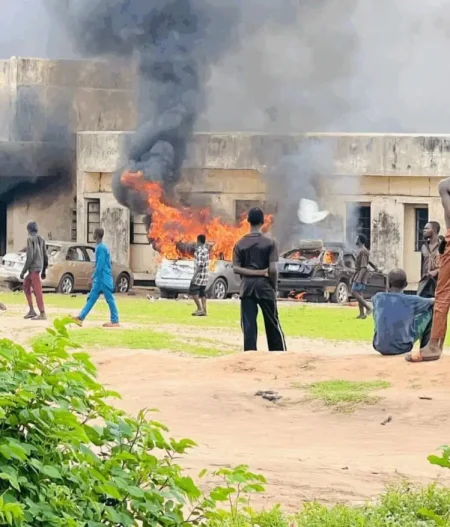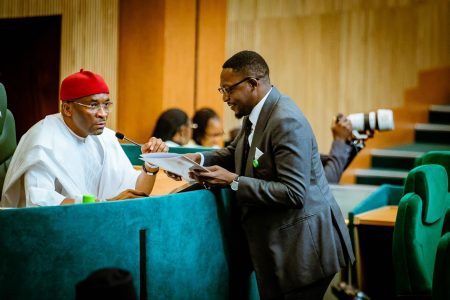Nigeria has unveiled “Project CNG-Sprout,” a national initiative deploying Compressed Natural Gas (CNG)-powered buses across universities. The project, commissioned yesterday in Abuja, underscores Nigeria’s commitment to green energy, environmental sustainability, and affordable student transportation.
Rt. Hon. Ekperikpe Ekpo, Minister of State for Petroleum Resources (Gas), said the initiative aligns directly with President Bola Ahmed Tinubu’s energy affordability and transition goals, especially in light of recent subsidy reforms.
“Project CNG-Sprout brings us closer to a vision of safe, affordable, and sustainable public transport powered by our abundant gas resources,” Ekpo said. “It’s not just a policy direction, it’s a practical solution for the Nigerian people, especially students.”
The scheme, implemented through a partnership between FEMADEC Energy and the Midstream and Downstream Gas Infrastructure Fund (MDGIF), introduces specially deployed CNG-powered buses and tricycles to Nigerian university campuses. It also supports the development of on-campus CNG refueling stations and vehicle conversion facilities.
The first phase of Project CNG-Sprout sees the deployment of 10 CNG buses and tricycles to Yakubu Gowon University, with similar deployments already underway at Obafemi Awolowo University, Ahmadu Bello University, and the Federal University of Technology, Owerri (FUTO).
Minister of Education, Dr. Maruf Alausa, said the project goes beyond transportation to include hands-on learning opportunities for students. CNG training centres will be set up in selected universities to equip students with relevant skills in green mobility and gas technology.
“We are not just solving transportation issues—we’re creating a learning environment for students to engage with cutting-edge energy solutions,” Alausa said.
He assured that future expansions would include CNG vehicle conversion centres and research-focused collaborations, effectively integrating transport innovation with academic advancement.
At the heart of the project is Nigeria’s drive to reduce carbon emissions and promote gas as a viable fuel alternative, consistent with global climate action goals and local energy security priorities.
Oluwole Adama, Executive Director of MDGIF, said the project reflects the vision of Executive Order 40, which supports fiscal incentives for gas-sector investments. He pledged the Fund’s continued support for high-impact, scalable energy projects that would increase domestic consumption of natural gas.
“Project CNG-Sprout is a direct product of the Renewed Hope Agenda. It is evidence of real infrastructure investments aimed at national transformation,” Adama said.
He noted that the project’s scope demonstrates serious government commitment, adding that CNG’s affordability and lower emissions make it ideal for Nigeria’s transport evolution.
Project CNG-Sprout complements the Presidential CNG Initiative, which aims to replace petrol-powered vehicles with cleaner CNG alternatives nationwide. With Nigeria possessing one of the largest gas reserves in Africa, stakeholders say that investing in domestic CNG infrastructure will help reduce fuel costs, cut emissions, and create jobs.
The project has been widely welcomed by environmentalists and transport experts who say it demonstrates how policy, technology, and education can intersect to deliver real, localized solutions.
In the coming months, the Federal Government plans to scale the project to more institutions and explore public-private partnerships for expanding CNG refueling networks.
For students across Nigeria, Project CNG-Sprout offers more than just a ride to class, it’s a glimpse into a greener, more sustainable future built on homegrown innovation and strategic policy reform.



![Man is not built to sexually be with one woman’ – 2Face Idibia [VIDEO]](https://kwaraexpress.com/wp-content/uploads/2025/07/IMG_2094-259x300.jpeg)







![Man is not built to sexually be with one woman’ – 2Face Idibia [VIDEO]](https://kwaraexpress.com/wp-content/uploads/2025/07/IMG_2094-450x522.jpeg)

